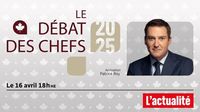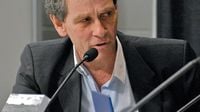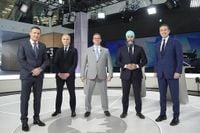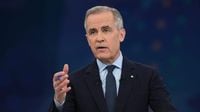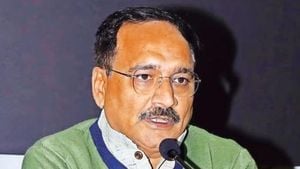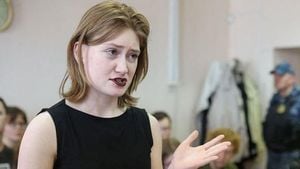The political landscape of Canada was shaken during the French-language leaders' debate held on April 16, 2025, as the leaders of four major parties clashed over pressing national issues. Moderated by Patrice Roy, the debate featured Yves-François Blanchet of the Bloc Québécois, Mark Carney of the Liberal Party, Pierre Poilievre of the Conservative Party, and Jagmeet Singh of the New Democratic Party.
This debate was not just a typical political exchange; it was a battleground for ideas and accusations that could sway undecided voters ahead of the upcoming federal election. The topics discussed spanned the cost of living, energy and climate issues, the trade war, immigration, identity, and sovereignty—issues that resonate deeply with Canadians.
Mark Carney, the Liberal leader, found himself in the crosshairs of his opponents. His performance was described as challenging, with no clear victor emerging from the debate. Carney’s grasp of French was deemed acceptable, but he struggled to articulate his stance on immigration thresholds, leading to moments of confusion. At one point, he proposed a "gas rebate" for Quebecers linked to the end of the carbon tax, a suggestion that seemed to backfire as he appeared uncertain.
Yves-François Blanchet seized the opportunity to link Carney to Prime Minister Justin Trudeau, accusing him of sharing the same hostility towards Quebec values. Blanchet's strategy was clear: to paint Carney as a continuation of Trudeau's policies, which many Quebecers have grown weary of. He stated, "You claim expertise in crisis management. I haven't seen any... We have to take your word, without political experience," highlighting Carney's inexperience in the political arena.
Pierre Poilievre, the Conservative leader, also targeted Carney, suggesting that he was merely echoing Trudeau’s promises without offering real change. "You’re just like Justin Trudeau... You’re not the change," Poilievre asserted, emphasizing a growing sentiment among conservatives that the Liberal Party has lost touch with voters' needs. He further accused Carney of wanting to raise taxes, saying, "You want to increase taxes all the time. You’re a Liberal. You love raising taxes." This line of attack seemed to resonate, as it played into the Conservative narrative of fiscal responsibility.
Both Blanchet and Jagmeet Singh criticized Carney’s budget proposals, likening them to "Harry Potter budgets" and "magic"—terms that imply unrealistic and fantastical financial planning. The debate moderator, Patrice Roy, interjected to express concern over the lack of financial transparency from all parties, calling it "totally irresponsible" that none had disclosed their financial frameworks.
Blanchet accused the Conservatives of wanting to "cut, cut, cut" while the Liberals sought to reduce revenues without increasing spending, a strategy he argued has never succeeded. Singh, on the other hand, took aim at Carney for prioritizing a meeting with the King over increasing unemployment benefits for Canadians affected by the trade war. The exchange highlighted the differing priorities of the parties and their leaders.
Amidst the heated exchanges, the topic of energy and climate emerged as a critical issue. Blanchet accused Poilievre of making empty statements regarding social acceptability for the status quo, claiming that his remarks were devoid of substance. In response, both Carney and Poilievre expressed support for increasing oil production in Canada, emphasizing the need to reduce imports, particularly from the U.S., which they described as a threat to Canadian sovereignty.
Adding to the controversy surrounding the debate was the exclusion of Jonathan Pedneault, the co-leader of the Green Party of Canada, who was barred from participating due to his party failing to meet the eligibility criteria set by the Commission des débats des chefs. This decision sparked further criticism of the Commission, which has faced scrutiny over its operations and funding.
The Commission, established in 2018 by Trudeau, costs taxpayers nearly $2 million annually, primarily for organizing debates. Critics argue that this public body, which has been tasked with ensuring fair and transparent debates, has not lived up to its mandate, especially given the recent controversies surrounding debate participation and scheduling.
With the only French-language debate now behind them, the focus shifts to the upcoming English-language debate scheduled for April 17, 2025, from 7 PM to 9 PM. Moderated by Steve Paikin, this debate will cover similar topics, including affordability and the cost of living, energy and climate, public safety, and tariffs affecting Canada. It remains to be seen whether the leaders will adjust their strategies based on the feedback from the French debate.
As Canadians prepare for the next phase of this election cycle, the stakes are high. The debates serve as a crucial platform for leaders to connect with voters and outline their visions for the country. With tensions running high and opinions divided, the outcome of these discussions could very well influence the direction of Canadian politics in the coming years.
